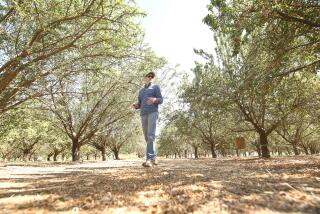Almond producers sue USDA
- Share via
WASHINGTON — A group of California almond growers and sellers is suing the U.S. Department of Agriculture over a year-old rule that requires them to pasteurize their nuts.
They say it’s ruining their business by driving organic- and raw-nut enthusiasts to unpasteurized foreign imports.
In a lawsuit announced Wednesday after it was filed in federal court in Washington, 15 growers and wholesale nut handlers seek reversal of the rule that was imposed in September 2007 after salmonella outbreaks that were traced to raw almonds.
The suit contends that handlers who paid a premium for raw almonds have been paying as much as 40% less for the pasteurized variety, or rejecting them altogether.
They argue that the rule was imposed without the proper rule-making process, didn’t take key issues into account and should be thrown out.
“This ruling is a financial disaster and has closed a major customer group that we have built up over the years,” said one plaintiff, Dan Hyman, an almond grower and owner of D&S; Ranches in Selma, Calif.
Hyman contended his customers were being denied “a healthy whole, natural raw food that they have eaten with confidence, enjoyment and benefit for decades.”
USDA spokesman Keith Williams said the agency had not seen the lawsuit and couldn’t comment.
California produces about 90% of the world’s almonds and virtually all almonds grown in the U.S., according to the Almond Board of California, a marketing arm of the USDA.
Last year that amounted to 1.3 billion pounds, worth more than $1.4 billion.
The almond board worked in favor of the rule after the 2001 and 2004 salmonella outbreaks, and spokeswoman Jenny Konschak had no comment on the lawsuit. She said organic almonds account for less than 1% of production.
In pasteurization -- a process also used for milk, juice and eggs -- the shelled and hulled nuts typically are laid out on a conveyor belt that passes them through a moist burst of steam to heat the kernels’ surface to about 200 degrees, killing any pathogens present. An alternative process sends the nuts into a chamber where they’re sprayed with propylene oxide gas.
The almond board concluded that pasteurization didn’t affect the quality of the almonds, but consumers interested in untreated food have been steering clear, and customer feedback has been extremely negative, the lawsuit’s plaintiffs say.
More to Read
Inside the business of entertainment
The Wide Shot brings you news, analysis and insights on everything from streaming wars to production — and what it all means for the future.
You may occasionally receive promotional content from the Los Angeles Times.










